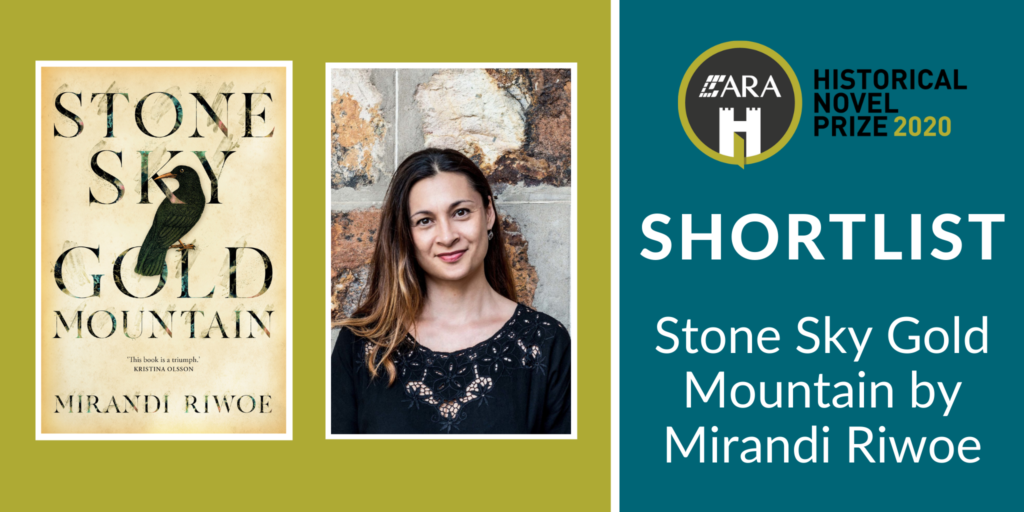
The Historical Novel Society Australasia (HNSA), alongside ARA Group, recently announced the 2020 shortlist for the inaugural ARA Historical Novel Prize. Stone Sky Gold Mountain by Mirandi Riwoe was one of the novels featured in the shortlist.
Mirandi Riwoe recreates the experiences of two Chinese siblings struggling to survive on the North Queensland goldfields in 1877. Richly imagined and eloquently expressed, Stone Sky Gold Mountain depicts a past too rarely portrayed in Australian fiction. Drawn to stories of the culturally marginalised, acclaimed author Riwoe explores big questions of identity, racism, colonialism and gender, with richly drawn characters and beautiful writing. Born in Brisbane, Riwoe has studied politics and also holds a PhD in Creative Writing and Literary Studies.
Judges Comments
Stone Sky Gold Mountain is set in north Queensland’s Palmer River goldfields in the 1870s. For siblings Lai Yue and Ying, who have travelled from China hoping to lift their family out of poverty, it is a place of hunger, theft, harassment, and only slender amounts of gold. When Ying befriends Meriem, a young white woman with her own burden of grief, they develop a complex relationship. Riwoe sensitively depicts the inner lives of her characters, who are struggling to survive in a hostile environment. Eloquent and richly imagined, the novel captures the complexity of diverse cultures thrown together in a violent past, and gives voice to people too often overlooked in Australia’s history.
An Interview with Mirandi Riwoe, Author of Stone Sky Gold Mountain
We chat with Mirandi below about the inspiration for her novel and what she enjoyed most about researching her novel.
What was your inspiration for your novel?
As part of my PhD I researched the Asian population of Victorian London for the crime novel I was writing. My father is Chinese, so I am always interested in writing Asian characters, and the protagonists of that crime novel are two Eurasian women. While exploring the British Asian population I began to wonder about the earliest Chinese in Australia. Being Eurasian, I find it fascinating when I hear about Australian people who are descended from a Chinese great-grandfather or great-great-grandfather who lived in some Victorian country town or North Queensland farming area in the 1800s. I wanted to write about a blossoming cross-cultural relationship between a Chinese person and a European Australian person.
Why did you feel the era of history about which you were writing needed to be told?
Although there were earlier Chinese visitors to our shores, the gold rush period seemed the obvious place to begin my research. I started out by looking to the Victorian gold fields, but eventually my gaze moved to Queensland until I struck the gold rush along the Palmer River. In Australian history, the Chinese in the gold rush were mostly regarded as a horde, as a huge, perhaps threatening mass. I wanted to find the individuals. Indeed, in the Palmer River area there were up to twenty thousand Chinese diggers, roughly five times the number of European Australians in the area. When I write, I like to depict those who have been elided or even ignored historically, such as women and the culturally diverse, and perhaps shift stubborn perceptions. I wanted to write of the period and attitudes that led up to the White Australia policy, and of the terrible hierarchy of racism.
What did you enjoy most about researching your novel?
All the research was fascinating – the histories, the memoirs, the pictures. Probably what I enjoyed the most, though, was the research trip I took to Cooktown with my husband. The museums there are a rich source of information and the Palmer River itself is just gorgeous. We hired a 4WD and travelled to the Maytown area to camp for the evening. The terrain is rugged, but what took us a couple of hours by car once took the Chinese diggers months on foot. Towards dusk, sitting on the river’s sandy shore – quite alone for kilometres around – it felt so strange to imagine how, one hundred and forty-five years ago, this peaceful riverbed would have been crowded with hundreds of Chinese men, industriously panning for gold, growing vegetables, carting goods, administering medicine, providing meals.
What challenges have you faced in your writing career, and in particular, during COVID?
The biggest challenge this year for me and my writing has been the constant distraction of what is happening here and abroad. Of course, it has also been disappointing to miss out on writers’ festivals and in-person events to discuss and promote my novel. However, readers and local bookshops have been so supportive and amazing. One bonus of all the Zoom book launches and in-conversations this year is that people from other parts of Australia and the world can attend my events and I can attend theirs, when usually this would be impossible.
Further Information
For further information about each of the authors and their novels, please visit 2020 ARA Historical Novel Prize Shortlist.
You can also read our first interview with Mirandi, which was part of our series of interviews with all the longlisted authors.
The winner of the ARA Historical Novel Prize will be announced in Sydney by both video broadcast and live streamed via the HNSA Youtube channel at 7.30pm on the evening of Tuesday, 10 November 2020. Subscribe to the channel to be first to hear the news.




